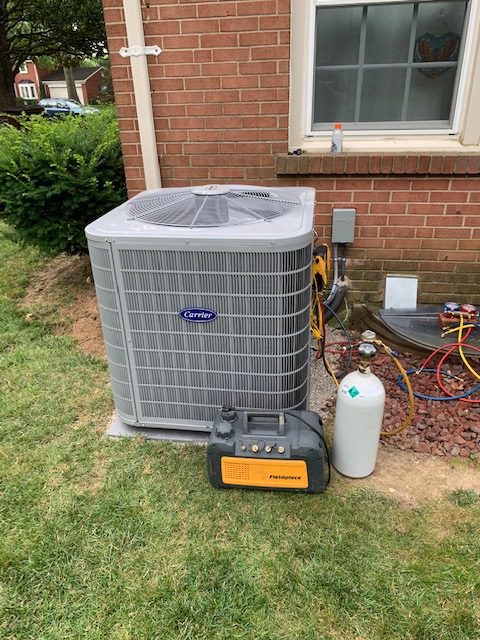Electrical Problems With Your AC or heat pump? Call in a professional

Has the central air conditioning in your home been stopping and starting without any apparent reason, tripping the circuit breaker, or just shutting down? These types of issues could be caused by problems with the AC’s wiring or electrical system. In this blog, we’ll discuss some of the underlying issues potentially related to electrical problems. In most cases, unless you’re experienced working with electrical systems, you’ll want to leave repairs to a local HVAC contractor or licensed electrician whom you can trust. Yet, that doesn’t mean you can’t do some careful troubleshooting yourself.
Potential Causes of Electrical Problems in Your AC
- Is wiring exposed? Inspect both inside and outside units of your split-system air conditioner or heat pump for any wires that are frayed or exposed. Don’t try to look for issues in any wiring that’s hard to access; leave that to the professional. If you do see exposed wiring, shut down the system until you can arrange a repair. Defective wiring is both a fire hazard and a potential shock risk. Another potential issue is that exposed wiring may allow moisture to infiltrate into sensitive electrical parts. That could mean a pricey repair.
- Is the AC or heat pump shutting down for no apparent reason? Another red flag signaling bad wiring is stop and start operation (and we don’t mean the regular cycling of the machinery as it responds to the thermostat). This could be a result of the cooling system’s safety features halting operation when the electrical current exceeds a maximum safety level.
- Are there defects in the appliance? A variety of mechanical issues can cause an HVAC system to short-circuit. It’s not unusual to see these problems crop up in major components of an AC or heat pump such as the compressor or capacitor.
- Is your thermostat the culprit? A definite possibility is defective wiring in the thermostat, especially if it’s an older model that has never been serviced or cleaned. The obvious fix for this problem? Get a new thermostat, and while you’re at it, upgrade to a multi-functional smart thermostat with full programmability.
Why Is the AC Tripping the Circuit Breaker?
The circuit breaker will trip if an appliance (in this case and AC or heat pump) is pulling excessive amperage from the appliance’s electrical system. You – or more likely your chosen Cincinnati HVAC contractor – will need to figure out why your cooling equipment is doing this, then effect a durable repair. While bad wiring could be at fault, your circuit breaker could be tripping because of another issue. That could include restricted airflow, a condensing coil covered with dirt or grit, unreasonable demands on the AC, and registers or vents that are blocked, among other potential causes.
If your AC or heat pump’s circuit trips just once or twice, there’s no reason to panic. Try resetting that circuit (switch it all the way off then back on), and if you’re lucky, the problem will be resolved instantaneously. However, if this keeps happening, it’s time to bring in a trusted HVAC technician or licensed electrician.
Your cooling equipment may be tripping the circuit because of issues with the circuit itself or wiring outside of the AC components. These could be anything from loose wiring to a defective circuit-breaker to power surges outside of your house, among other potential issues.
As stated previously, if the air conditioner or heat pump is repeatedly tripping the circuit breaker, that’s probably because the equipment is pulling more amps than the circuit breaker can deal with; your AC is essentially working harder than it’s designed for.
Reasons Why Your AC Is Overworked
- It’s common during the hot summer months for home occupants to expect their AC to continue cooling the home to 68 degrees no matter how hot or muggy it is outside. This is a mistake, since it’s unreasonable to expect an AC to lower interior temperatures by 20 degrees or more. Cut your system a break when it’s sizzling outside; try setting the thermostat to 76 degrees instead of 68. It won’t kill you, and in the process, you’ll save on electricity while lowering the risk of a future system breakdown.
- If you have a dirty air filter, your AC or heat pump will have to work harder and longer to push air through the filter and satisfy the temperature setting on the thermostat. Inspect the filter and change it if it looks clogged.
- Your condensing coil may be dirty, which hampers the essential heat-exchange process that indoor cooling requires. Dirt and grime make it more difficult for the coil in the outside unit to expel heat energy collected in the house into the outside air. While a handy homeowner can clean the coil, this task (and many others) can be done during seasonal professional maintenance.
- An array of other technical issues could be forcing your cooling equipment to overwork itself, including low refrigerant in the system (the technician should check for leaks if the coolant is low), a defective condenser fan, a faulty capacitor or problems with other components.
Don’t hesitate to call your local HVAC professional or licensed electrician for any electrical issues with your cooling and heating system.
